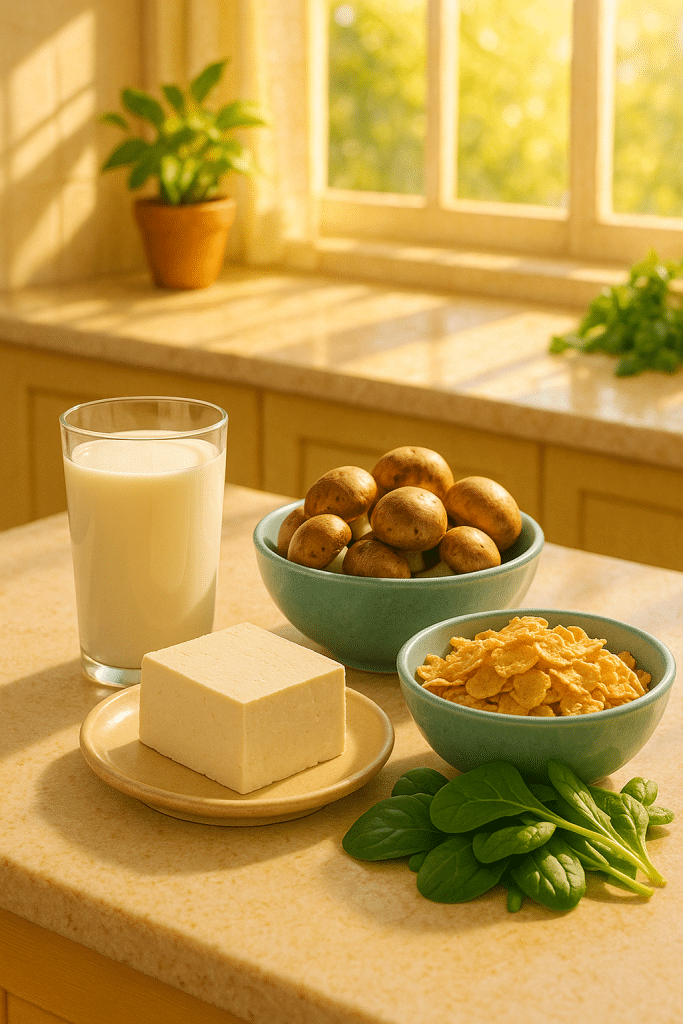As someone who embraces a vegetarian lifestyle and prioritizes nutritional well-being, I understand the unique challenges we face in meeting certain nutrient requirements—especially vitamin D. This fat-soluble vitamin plays a critical role in maintaining bone health and supporting immune function, but many natural sources are animal-derived, making it tricky for vegetarians to get enough from diet alone. Fortunately, the world of vegetarian-friendly vitamin D foods has expanded considerably, and today I’m excited to share six powerful vitamin D foods for vegetarians that can help you maintain optimum health.
We’ll explore the importance of vitamin D, dive into plant-based and fortified sources, and cover nutritious, accessible options ranging from fortified milks and cereals to UV-exposed mushrooms and dairy-free yogurts. Along the way, I’ll include practical tips, product highlights, and how you can integrate these foods easily into your daily routine. Whether you’re new to vegetarian eating or looking to optimize your vitamin D intake, this comprehensive guide will equip you with actionable insights and delicious ideas to keep your vitamin D status robust and your body thriving.
Understanding the Importance of Vitamin D for Vegetarians
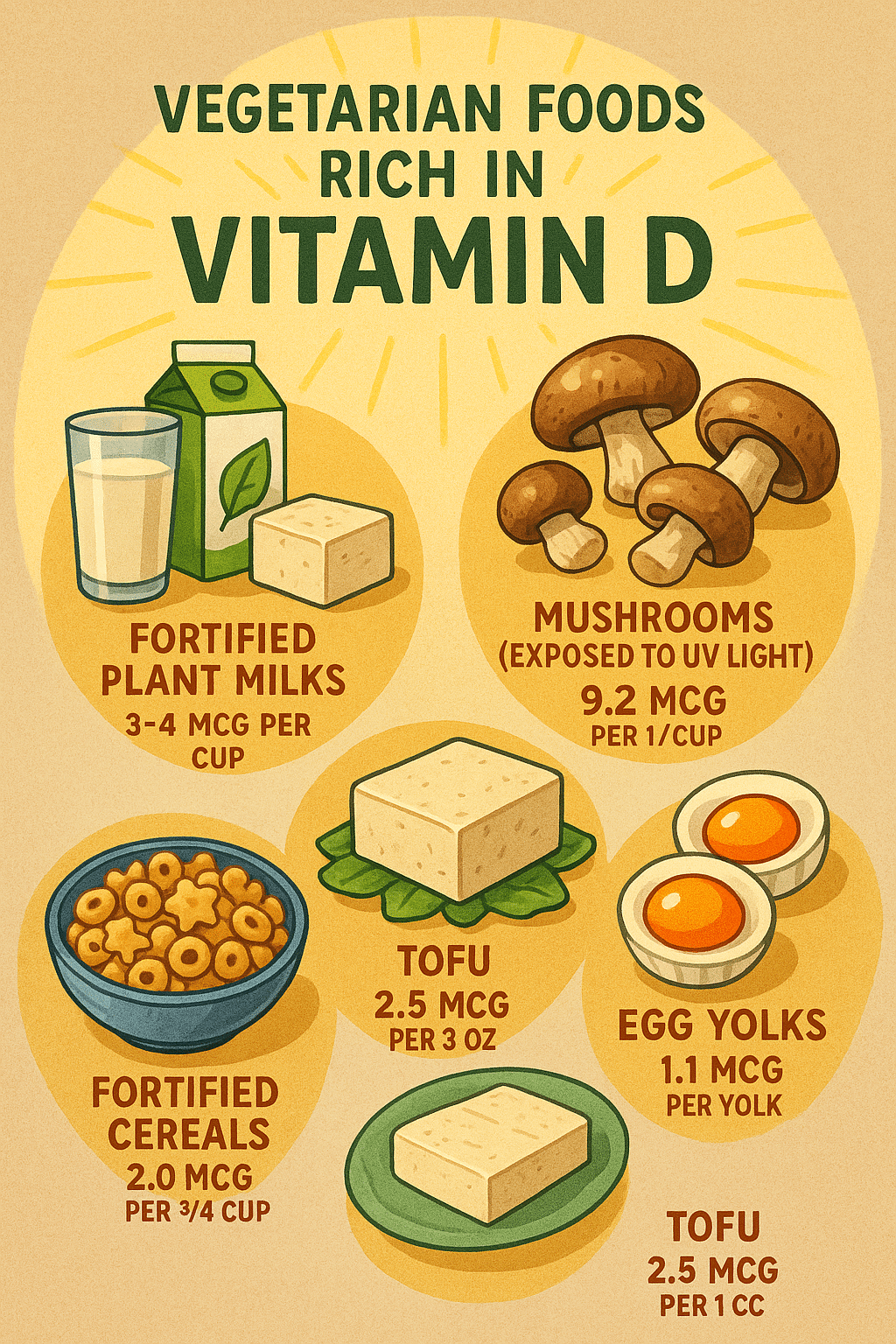
Vitamin D is often called the “sunshine vitamin” due to the body’s ability to produce it upon sun exposure. But beyond just soaking up sunlight, vitamin D serves indispensable roles that every vegetarian should appreciate.
Role of Vitamin D in Bone Strength and Immune Function
Vitamin D encourages efficient calcium absorption in the gut, which is essential for keeping bones dense and strong. Without adequate vitamin D, bones may become fragile or misshapen, increasing the risk of fractures and conditions like osteoporosis. For vegetarians who may consume plant-based sources of calcium—such as leafy greens and fortified foods—adequate vitamin D is crucial to make that calcium count.
Moreover, vitamin D regulates immune system responses. Researchers have linked sufficient vitamin D levels to reduced risks of infections, autoimmune diseases, and overall immune system optimization. This synergy is vital for vegetarians seeking to maintain strong defenses naturally through diet and lifestyle.
Challenges in Obtaining Vitamin D on a Vegetarian Diet
Vitamin D is naturally present in very few foods, most notably fatty fish, egg yolks, and liver, which aren’t on typical vegetarian menus. This makes vegetarians reliant on alternatives like sunlight, fortified foods, and supplements. Geographic location, skin pigmentation, indoor lifestyles, and seasonal changes can all limit sunlight-driven vitamin D synthesis.
Unfortunately, many vegetarian foods have low or no vitamin D unless they’re specifically fortified. This makes identifying reliable plant-based sources and fortified options essential, which I’ll cover in detail ahead.
Differences Between Vitamin D2 and D3 and Their Vegetarian Sources
Vitamin D exists mainly in two biomolecular forms:
-
Vitamin D2 (Ergocalciferol): Found mostly in fungi like mushrooms, D2 is derived from plant and fungal sources—typically vegetarian and vegan-friendly.
-
Vitamin D3 (Cholecalciferol): Traditionally sourced from animal products (lanolin from sheep’s wool), though nowadays vegetarian D3 is available from lichen sources, a type of algae.
Both forms raise blood vitamin D levels, though some research suggests D3 might be somewhat more effective long term. Vegetarians can consume either form, but vegans especially need to look for D2 or lichen-derived D3 to ensure compliance.
Fortified Plant-Based Milks: A Convenient Vitamin D Source
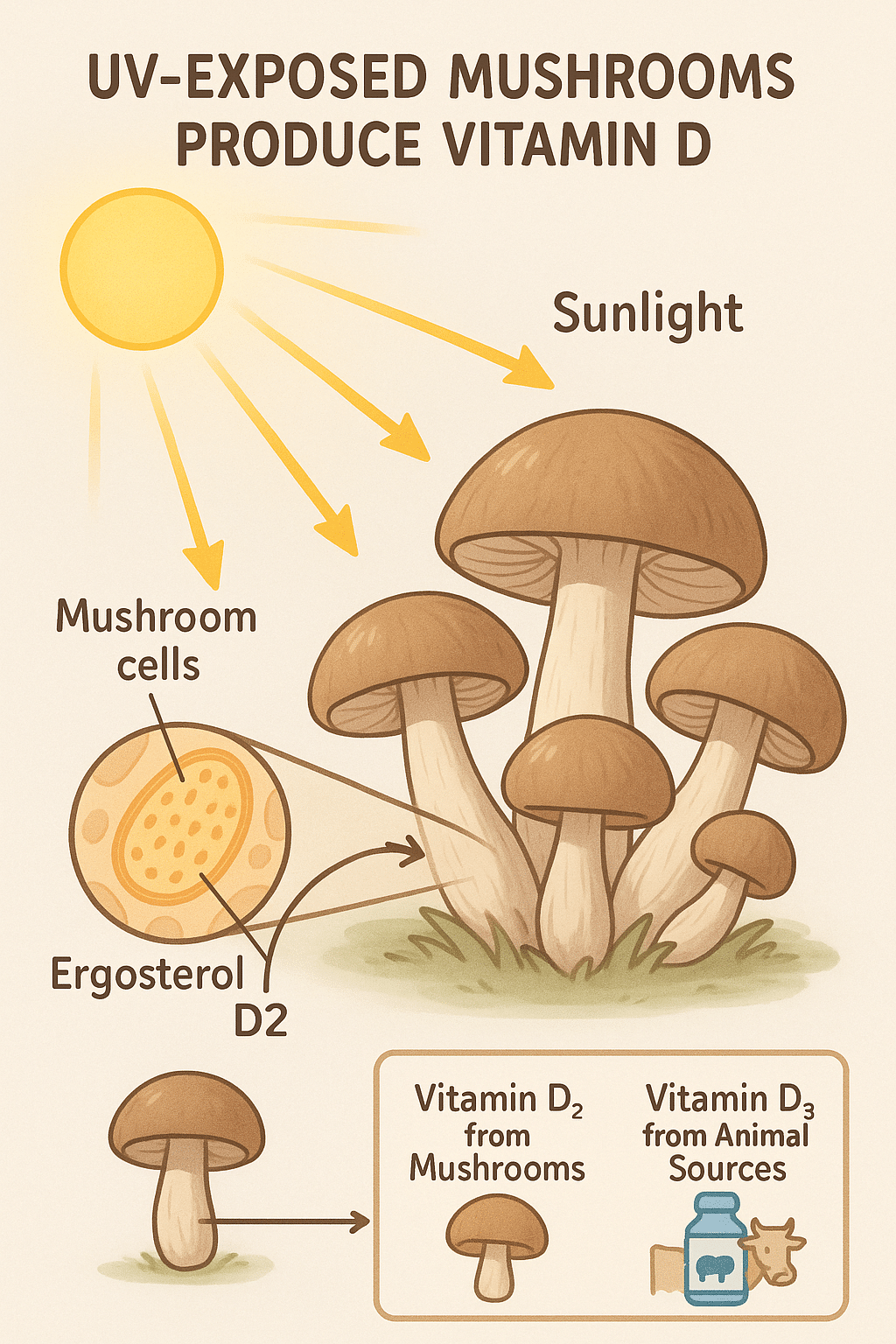
Plant-based milks have skyrocketed in popularity, and many brands fortify their products with vitamin D, making them excellent go-to sources for vegetarians.
Types of Plant-Based Milks Fortified with Vitamin D
Popular fortified plant-based milk alternatives typically include:
- Soy Milk
- Almond Milk
- Oat Milk
These beverages often contain added vitamin D, calcium, and other nutrients to mimic the nutritional profile of cow’s milk without animal ingredients.
Soy Milk: Highlight on Silk Soymilk Original
I highly recommend Silk Original Soymilk, a creamy, smooth soy milk that provides 8 grams of protein per serving and added vitamin D and calcium. It’s dairy-free, gluten-free, lactose-free, and free from artificial flavors and colors, making it a wholesome choice.
Silk Soymilk is widely accessible online and in stores like Amazon, Walmart, and local supermarkets. It serves as a foundational milk alternative that fits seamlessly into smoothies, cereals, or coffee.
Almond and Oat Milk Options
Brands offering almond and oat milks often fortify their products with vitamin D as well. When purchasing, check nutrition labels for at least 100 IU (2.5 micrograms) of vitamin D per serving to ensure meaningful contribution. These milks provide varied textures and flavors and can be included in baking, cooking, or consumed standalone.
How to Choose High-Quality Fortified Plant Milks
When selecting plant-based milks, here are some pointers:
- Check the vitamin D content on the label (aim for 100 IU or more per cup).
- Prefer brands with minimal added sugars to reduce empty calories.
- Choose products fortified with both vitamin D and calcium for optimal bone health synergy.
- Consider protein content, especially for soy options, to meet overall nutrition goals.
- Look out for clean ingredient lists without preservatives or additives not essential for shelf stability.
Fortified Cereals: Boosting Vitamin D Intake at Breakfast
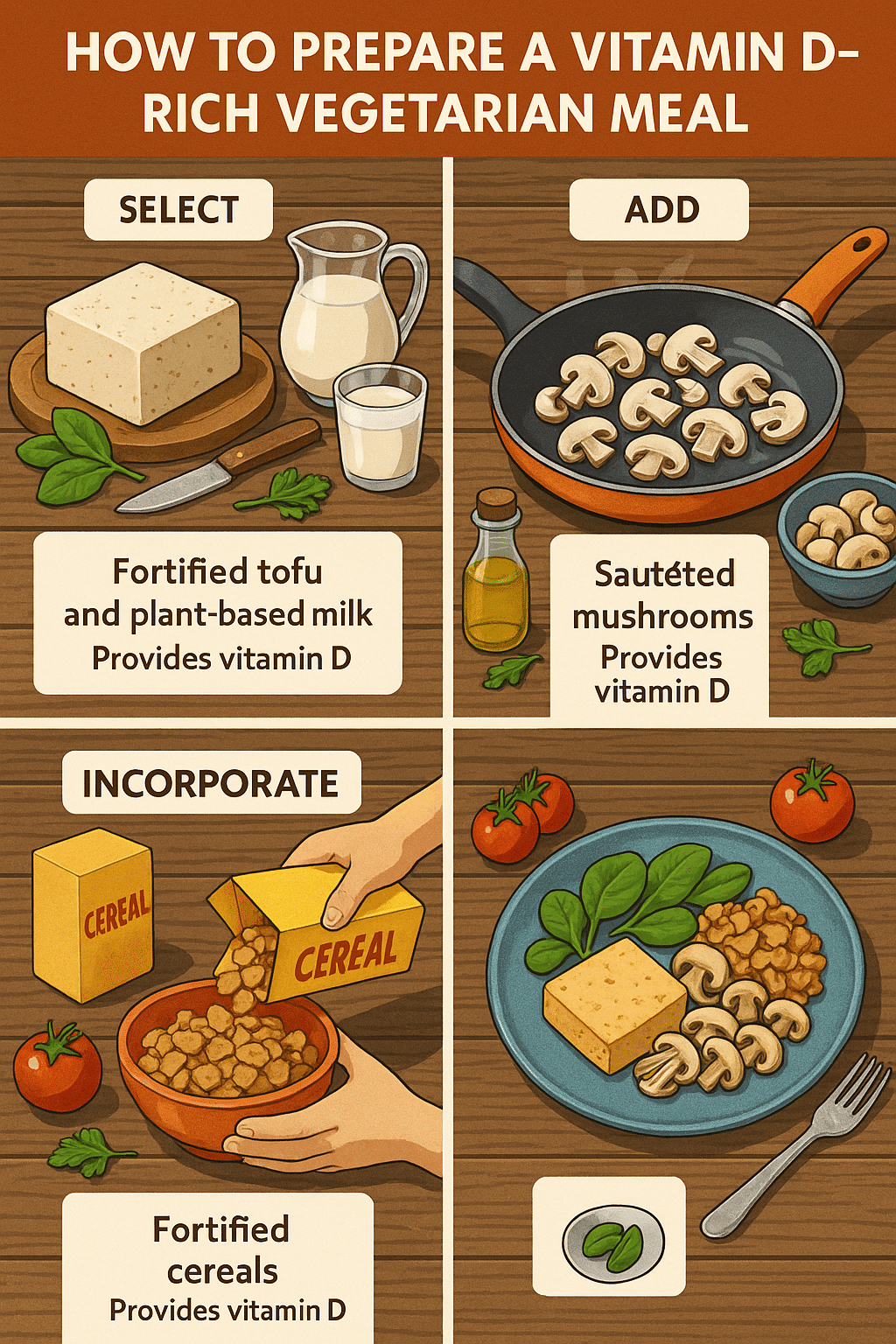
Breakfast is a critical meal to set the tone for nutrient intake, and fortified cereals make adding vitamin D straightforward.
Benefits of Including Fortified Cereals
Fortified cereals combine added vitamins and minerals, including vitamin D, iron, and B vitamins, with convenience and taste. For vegetarians, this is an easy, shelf-stable, quick option that pairs well with fortified plant-based milks and fruit.
Spotlight on Kellogg’s Special K Original Cereal
Kellogg’s Special K Original Cereal is a staple breakfast choice providing fortification with vitamin D among other nutrients. It has moderate calories, balanced fiber, and basic sweetness—making it a good option for daily consumption.
Available in varying sizes on platforms like Amazon, Walmart, and Kroger, it offers seasonal discounts occasionally, so bulk buying can be economical.
Nutritional Tips for Selecting the Best Cereals
When picking fortified cereals, consider:
- Vitamin D and calcium content per serving.
- Added sugar levels (prefer cereals with under 8 grams per serving).
- Fiber content for digestive health benefits.
- Whole grain ingredients for extra nutrients.
- Serving size and portion control to balance calories.
Fortified cereals combined with fortified plant milks can significantly elevate your vitamin D intake each morning.
Fortified Orange Juice as a Refreshing Vitamin D Source
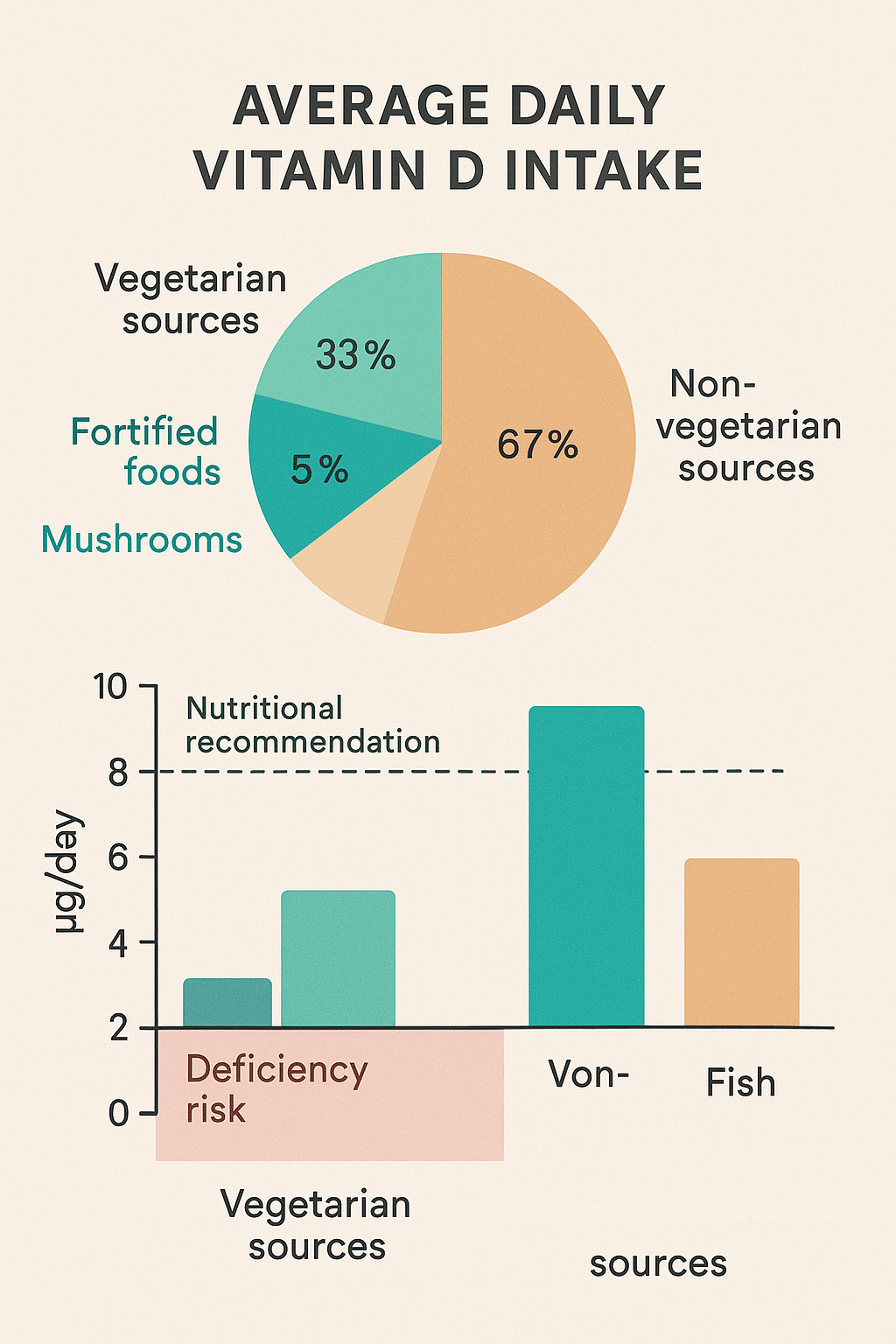
For those who prefer juices or want to add variety, fortified orange juice can be a delicious vitamin D carrier with a bonus of immune-supporting vitamin C.
Vitamin D Fortification in Orange Juice
Orange juice fortified with calcium and vitamin D is widely available, ensuring vegetarians and others who avoid dairy still gain those key nutrients.
Overview of Tropicana Fortified Orange Juice Varieties
Tropicana offers several vitamin D-fortified products, including:
- Tropicana Pure Premium No Pulp Calcium + Vitamin D (89 fl oz), a rich, pulp-free classic juice.
- Tropicana 100% Orange Juice Original No Pulp, Single Serve, convenient on-the-go bottles.
- Bulk packs of 15.2 fl oz and 10 fl oz bottles via Amazon and Walmart for affordability and variety.
Combining Vitamin D Intake with Vitamin C Benefits
Vitamin C in orange juice supports immune health and enhances iron absorption from plant foods. Together with vitamin D, fortified orange juice serves as a nutritional powerhouse that’s refreshing and easy to incorporate into breakfast or snacks.
Tofu: A Versatile Vitamin D-Fortified Protein
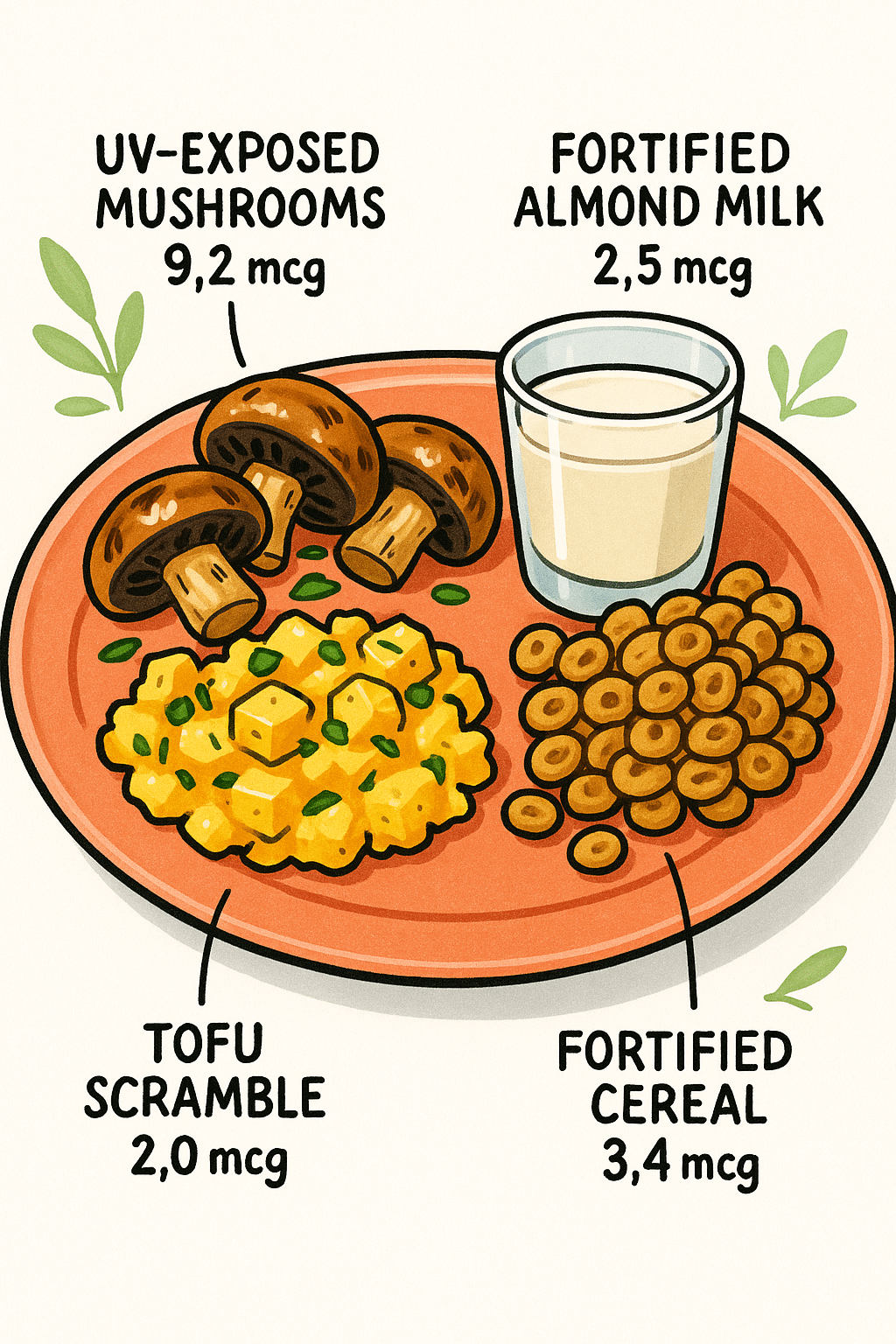
Tofu is a plant-based protein staple, often fortified with vitamin D, making it an essential vegetarian source.
Nutritional Profile of Fortified Tofu
Fortified tofu packs protein, calcium, and sometimes added vitamin D, depending on brand and type. It’s low in calories, cholesterol, and carbohydrates, with beneficial isoflavones, making it an excellent choice for bone and heart health.
Nasoya Organic Extra Firm Tofu as a Recommended Choice
Nasoya Organic Extra Firm Tofu is widely regarded for quality and fortification. It carries USDA organic certification and contains vitamin D alongside calcium.
Purchasable through retailers like Kroger, Walmart, Fairway Market, Instacart, and more, Nasoya emerges as a reliable option for vegetarians looking for nutrient density and versatility.
Creative Ways to Incorporate Fortified Tofu into Meals
- Stir-fry with vegetables and a ginger garlic sauce.
- Crumble into tacos or salads for a protein boost.
- Marinate, bake, or grill for appetizers or main dishes.
- Blend into smoothies or puddings for creaminess with nutrients.
- Use in vegan scrambles to replace eggs.
Mushrooms: Natural Plant-Based Vitamin D Sources
Certain mushrooms can synthesize vitamin D when exposed to ultraviolet (UV) light, making them a rare natural vegetarian plant source.
Vitamin D Synthesis in UV-Exposed Mushrooms
When mushrooms like shiitake or maitake are exposed to UV light, their ergosterol converts to vitamin D2, mimicking sunlight’s effect on human skin and boosting vitamin D concentration dramatically.
Types of Mushrooms Rich in Vitamin D (Shiitake, Maitake)
- Shiitake: Popular in Asian cuisine, with a meaty texture and rich flavor.
- Maitake: Known as “hen of the woods,” packed with nutrients and antioxidants.
Monterey Mushrooms’ UV-Exposed Products and Where to Buy
Monterey Mushrooms offers specially UV-treated varieties including sliced white, baby bella, and portabella mushrooms enriched with vitamin D. You can find these in many grocery locations nationwide.
Culinary Ideas for Using Vitamin D-Rich Mushrooms
- Sauté with garlic and herbs as a side dish.
- Add to omelets, stir-fries, or pasta sauces for depth.
- Use as burger toppings or in vegetarian wraps.
- Incorporate into creamy soups or risottos.
Fortified Plant-Based Yogurts: Dairy-Free Vitamin D Boost
For vegetarians avoiding dairy, fortified plant-based yogurts are excellent for adding vitamin D along with probiotics.
Benefits of Fortified Plant-Based Yogurts
These yogurts provide gut-friendly probiotics with added vitamin D and calcium, supporting digestion and bone health simultaneously.
So Delicious Dairy Free Coconut Milk Yogurt as a Prime Option
So Delicious Dairy Free Coconut Milk Yogurt offers an unsweetened plain version fortified with vitamin D2. It’s dairy-free, gluten-free, and ideal for those seeking a rich tropical flavor without animal ingredients.
How to Integrate Plant-Based Yogurts Into Your Daily Diet
- Add to smoothies for creaminess and nutrition.
- Enjoy as a snack with fresh fruit and granola.
- Use as a base for dips or sauces.
- Substitute for sour cream or dairy yogurt in recipes.
Additional Vegetarian Sources and Supplementation Options
Vegetarians have more vitamin D-accessible foods than often realized, beyond the main six covered.
Fortified Margarine and Plant-Based Meat Alternatives
Many fortified margarines contain added vitamin D and can be used as spreads or cooking fats. Some plant-based meat substitutes may also be fortified, so always check packaging labels.
Inclusion of Chia Seeds for Overall Nutritional Support
While chia seeds don’t provide vitamin D, they offer omega-3 fatty acids, fiber, and minerals that complement bone and immune health.
Lacto-Ovo Vegetarian Considerations: Egg Yolks as a Vitamin D Source
For lacto-ovo vegetarians, egg yolks are a natural vitamin D source, though amounts vary by the hen’s diet and sunlight exposure.
When and How to Consider Vitamin D Supplementation
If food sources and sunlight exposure are insufficient, supplements—particularly vegetarian D3 (from lichen) or D2—may be warranted. Consult healthcare providers for testing and dosage guidance.
Optimizing Vitamin D Absorption and Synergy
Vitamin D works best in concert with other factors:
The Synergistic Role of Calcium and Vitamin D
Adequate calcium is needed for vitamin D to properly facilitate bone mineralization. Combining fortified calcium and vitamin D-rich foods maximizes benefits.
Sunlight Exposure: Natural Vitamin D Synthesis and Limitations
Safe, moderate sun exposure supports natural vitamin D synthesis, but latitude, season, skin color, and sunscreen use affect production. Aim for 10-30 minutes of midday sun a few times a week, adjusting as needed.
Dietary and Lifestyle Strategies to Maximize Vitamin D Levels
- Pair vitamin D foods with healthy fats for better absorption.
- Maintain a balanced diet rich in vegetables, fruits, and whole grains.
- Monitor vitamin D status through regular blood tests.
- Discuss supplementation or dietary changes with a nutritionist or health professional.
Recipe Inspirations Featuring Vitamin D Foods for Vegetarians
Breakfast Ideas with Fortified Cereals and Plant-Based Milks
- Vitamin D Boosted Berry Cereal Bowl: Combine Kellogg’s Special K, Silk Original Soymilk, fresh berries, and a sprinkle of chia seeds for a nutrient-packed breakfast.
Creative Lunch and Dinner Using Fortified Tofu and Mushrooms
- Tofu and Shiitake Stir-Fry: Stir-fry Nasoya Extra Firm Tofu with Monterey UV-exposed shiitake mushrooms, broccoli, bell peppers, and tamari sauce. Serve with brown rice for a wholesome meal.
Snacks and Smoothies Incorporating Fortified Yogurts and Orange Juice
- Tropical Vitamin D Smoothie: Blend So Delicious Coconut Milk Yogurt, Tropicana Fortified Orange Juice, banana, and spinach for an immune-supporting snack.
Final Thoughts: Achieving Balanced Vitamin D Intake on a Vegetarian Diet
Ensuring adequate vitamin D intake as a vegetarian requires mindful food choices, fortified products, and lifestyle considerations. Regular monitoring and consultations with healthcare providers help tailor your vitamin D strategy effectively.
Embracing fortified plant-based milks like Silk Original Soymilk, fortified cereals such as Kellogg’s Special K, Tropicana fortified orange juice, nutritionally rich Nasoya tofu, vitamin D-enhanced Monterey mushrooms, and dairy-free yogurts like So Delicious Dairy Free can transform your dietary approach toward optimum bone health and immune resilience.
By integrating these powerful vitamin D foods for vegetarians into your daily routine and balancing them with sunlight and possibly supplementation, you can confidently support your well-being now and for the long haul.
FAQs
1. What are the best vitamin D rich foods for vegetarians?
The best foods include fortified plant-based milks (soy, almond, oat), fortified cereals like Kellogg’s Special K, fortified orange juice such as Tropicana varieties, fortified tofu like Nasoya, UV-exposed mushrooms (e.g., Monterey Mushrooms), and fortified plant-based yogurts such as So Delicious Dairy Free.
2. Can vegetarians get enough vitamin D from mushrooms?
Yes, especially when consuming UV-exposed mushrooms like shiitake and maitake which are rich in vitamin D2. Including these mushrooms regularly can contribute significantly to vitamin D intake.
3. How do fortified cereals help vegetarians meet vitamin D needs?
Fortified cereals supply added vitamin D alongside other essential vitamins and minerals. When paired with fortified plant milks, they provide a convenient, palatable breakfast solution for vegetarians.
4. Is vitamin D2 as effective as vitamin D3 for vegetarians?
Both forms raise vitamin D levels, though research shows vitamin D3 may be slightly more effective in maintaining serum levels. Vegetarian D3 derived from lichen is a great option for those preferring this form.
5. Should vegetarians consider vitamin D supplements?
Yes, if dietary intake and sun exposure are insufficient to maintain adequate vitamin D levels, supplementation—especially vegetarian-friendly D3 or D2—may be recommended after consulting a healthcare provider.
Quick Takeaways / Key Points
- Vitamin D supports bone strength and immunity, both critical for vegetarians.
- Sunlight, while important, often needs to be supplemented by vitamin D-rich foods.
- Fortified plant-based milks like Silk Soymilk Original are convenient vitamin D sources.
- Consuming fortified cereals such as Kellogg’s Special K enhances vitamin D intake, especially at breakfast.
- Fortified orange juice, e.g., Tropicana, offers vitamin D plus immune-boosting vitamin C.
- UV-exposed mushrooms from Monterey Mushrooms provide natural vitamin D2.
- Fortified plant-based yogurts like So Delicious Dairy Free provide both probiotics and vitamin D.
- Fortified tofu varieties, including Nasoya Organic Extra Firm, add protein and vitamin D.
- Balanced diet, sun exposure, and supplementation as needed are key to maintaining optimal vitamin D levels.
Ready to energize your vegetarian diet with these vitamin D superfoods? Try incorporating one or more of these options into your meals this week and see the difference it makes. Remember, your bone health and immune system will thank you! Stay radiant and vibrant by embracing fortified foods and natural sources that fit your lifestyle perfectly.

